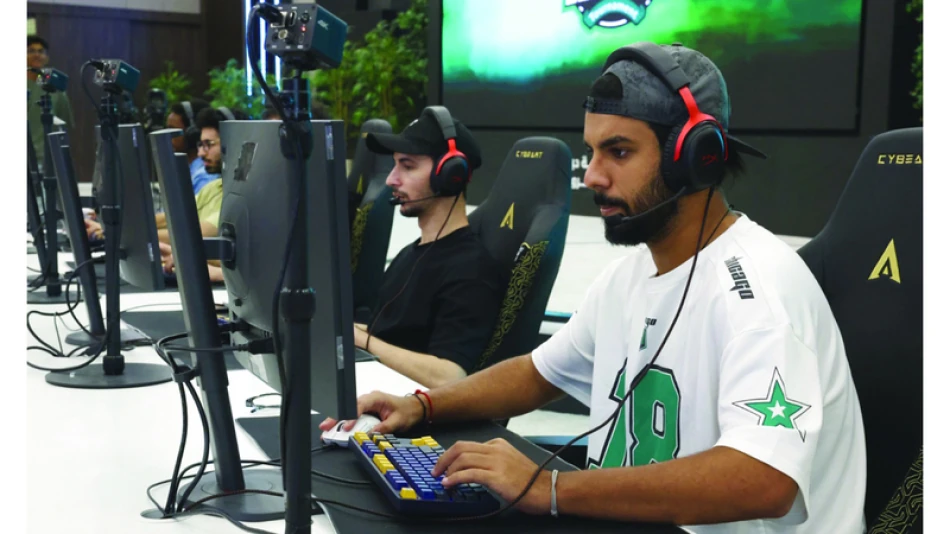
Dubai Police eSports Tournament Attracts 1,500 Gamers in Thrilling Competition
Dubai Police Weaponizes Gaming: Major Esports Tournament Becomes Cybercrime Awareness Platform
Dubai Police is transforming competitive gaming into a cybersecurity education tool, hosting over 1,500 players from diverse nationalities at its fifth annual esports championship while simultaneously delivering crucial lessons about online fraud, digital privacy, and gaming-related crimes. The four-day tournament, running August 14-17 at the Dubai Police Officers Club in Al Jaddaf, offers 200,000 dirhams in prize money across eight competitions—but the real prize may be the digital literacy skills participants gain.
Strategic Gaming: Police Meet Players Where They Are
The tournament targets ages 10-35, both male and female, recognizing that traditional cybersecurity awareness campaigns often fail to reach younger demographics effectively. By embedding educational content within a competitive gaming environment, Dubai Police demonstrates sophisticated understanding of how to engage digital natives on their preferred platforms.
This approach reflects broader global trends where law enforcement agencies struggle to keep pace with rapidly evolving cyber threats. Rather than fighting against gaming culture, Dubai Police has chosen to work within it, creating what amounts to a cybersecurity boot camp disguised as entertainment.
Beyond Competition: Addressing Gaming's Dark Side
Cybercrime Education Through Play
The tournament serves as a launch pad for Dubai Police's comprehensive digital awareness program, focusing on several critical areas that plague the gaming community. Participants receive education about electronic fraud schemes that specifically target gamers, including fake in-game currency sales, account theft operations, and romance scams that often begin in gaming chat rooms.
The timing is strategic. As global gaming revenues approach $200 billion annually, cybercriminals increasingly view gaming platforms as lucrative hunting grounds. Young players, often with access to family payment methods but limited fraud awareness, represent particularly vulnerable targets.
Privacy Protection in Connected Worlds
The educational component emphasizes protecting personal information during gaming sessions, addressing a widespread problem where players casually share sensitive data through in-game communications. This focus on privacy protection extends beyond gaming to broader digital literacy skills essential for navigating today's connected world.
Regional Leadership in Digital Policing
Dubai's approach positions the emirate as a regional leader in proactive cybersecurity education, contrasting with reactive approaches common elsewhere in the Middle East. While neighboring countries often focus on restricting gaming or implementing broad internet controls, Dubai Police demonstrates how law enforcement can engage constructively with digital communities.
This strategy aligns with the UAE's broader vision of becoming a global technology hub, where digital innovation and security awareness must develop in parallel. The tournament creates a model that other Gulf states may replicate, potentially establishing new standards for community-based cybersecurity education.
Family Engagement: Bridging Generational Digital Divides
The inclusion of entertainment competitions between players and parents addresses a critical gap in most cybersecurity initiatives. Parents often lack understanding of their children's digital activities, creating blind spots in family security practices. By bringing families together in gaming contexts, the tournament helps parents understand both the appeal and risks of their children's online activities.
This family-focused approach may prove more effective than traditional awareness campaigns that typically target individuals in isolation. When parents and children develop digital literacy skills together, families create stronger collective defenses against cyber threats.
Measuring Success Beyond Scoreboards
The tournament's true measure of success lies not in gaming achievements but in behavioral changes among participants. If players begin reporting suspicious activities through Dubai Police's Ecrime platform, maintain better privacy practices, and demonstrate improved awareness of financial scams, the initiative will have achieved its primary objectives.
For other law enforcement agencies worldwide, Dubai Police's gaming tournament offers a replicable model for community engagement in the digital age. Rather than viewing online gaming as a problem to be solved, this approach treats it as an opportunity for education and community building—a perspective that may prove essential as digital and physical worlds continue to converge.
Most Viewed News

 Sara Khaled
Sara Khaled






